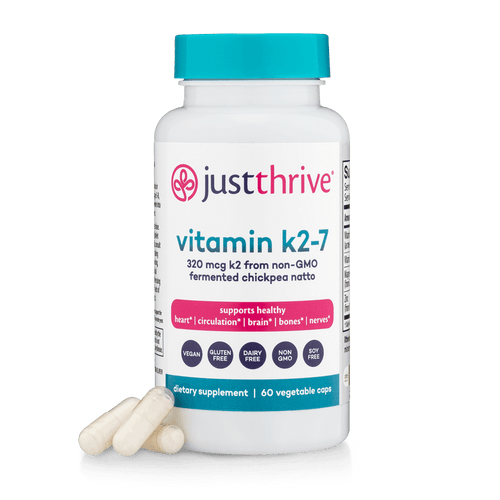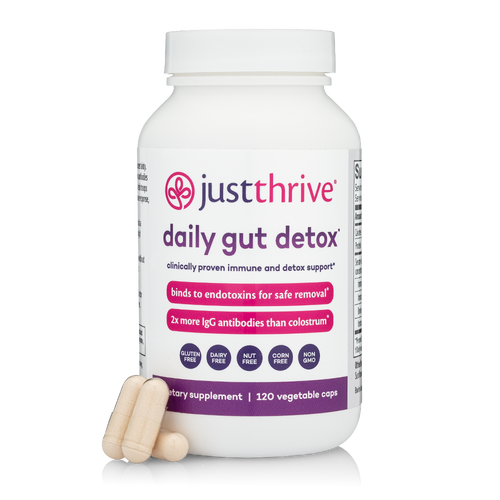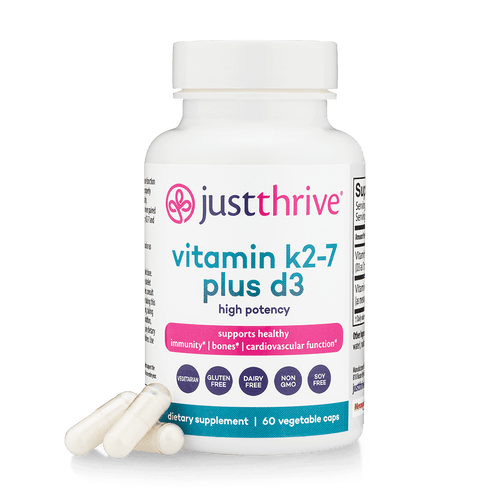Just like you learned about the alphabet when you were in grade school, for your best overall health and wellness, it's important to understand the "alphabet" of vitamins. Since you're reading this, it's likely you already know your ABC basics: Vitamin B is great for energy, vitamin C can help drive your immune system and D works to promote healthy bones, immunity, and brain health... But how much do you know about vitamin K2?
Unfortunately, K2 and its many benefits get regrettably little attention in the broader health landscape. However, this power-packed nutrient is not only a foundational part of your overall health, it's crucial for numerous critical process in the body, like:
- Building strong bones
- Promoting a healthy heart
- Managing blood sugar
- and so much more!
Read on for a closer look at vitamin K2, including where it comes from and how you can incorporate it into your daily health regimen.
"Activator X" And The Discovery of a Dental Miracle
About 80 years ago, a visionary dentist named Weston A. Price discovered what he believed to be the key to optimal dental health.
He’d been studying specific tribes around the world that hadn’t yet been exposed to Western culture. Despite the fact that most of the people had never even heard of toothbrushes, many boasted strong, straight, healthy teeth with virtually no cavities or gum disease.
On his quest to understand why, Price dissected the different tribes eating habits. He found that there was one particular dietary compound that all the healthy tribes: This compound acted as a powerful absorption catalyst, helping the body fully utilize important proteins and minerals. He named his discovery, "Activator X."
Only in recent years has the scientific community come to realize that Activator X – which is now known as vitamin K2 – is (among other things) a crucial nutrient for teeth and bones.

The Many Significant Benefits Vitamin K2
Despite its lack of mainstream attention, there are considerable advantages to getting your required daily amount of K2. In fact, some researchers now believe that K2 may be one of the single most important dietary nutrients available. Let's take a look at 8 of vitamin K2's key health benefits:
1. Directs Calcium to the Right Places
Calcium is crucial for your body. When uses correctly, it promotes strong bones and teeth and healthy communication between the brain and other parts of the body. It even supports muscle movement and cardiovascular function!
However, all that calcium you're getting from food and supplements needs help to get to where it's needed You see, if it's left undirected, Calcium has a habit of wandering... Instead of going to your bones, it can end up in your soft tissue, instead. This can be a big problem, resulting in calcification (a hardening of the tissues) that can lead to bone spurs, liver and kidney stones, stiff blood vessels, heart disease, or major cardiac events.
That’s where vitamin K2 comes in. It acts as an air traffic controller, directing calcium exactly where it needs to go. In your body, it prevents calcium deposits from forming in your blood vessels, kidneys, liver, or other soft tissue. It even works to remove calcium from your arteries. In turn, it directs calcium to the places of your body where it can do the most good.
2. Promotes a Healthy Heart
When vitamin K2 directs calcium properly, hard deposits are prevented from forming inside soft tissues such as artery walls. This, in turn, keeps your blood vessels optimally flexible, ensuring smooth, easy blood flow and circulation.
By promoting healthy arteries and blood vessels, vitamin K2 takes stress off the heart. Without having to try to push blood through clogged arteries, your heart doesn’t have to pump as hard. This makes your heart’s job easier and keeps it healthy and happy!
Numerous studies have proven the positive correlations between vitamin K2 intake and heart health. Two of the more well known are:
- Vitamin K2 and the incidence of coronary heart disease
- The Rotterdam Study (vitamin K2, heart health, and longevity)
3. Drives Bone Health
Not only does vitamin K2 direct calcium to your bones, it also supports your body in converting the calcium into into a structure-building tool.
You see, there are two proteins responsible for alchemizing calcium: matrix GLA protein and osteocalcin. These proteins are powerful, but, they need someone to give them the signal that it's time to go into action.
Vitamin K2 acts like an "on switch," telling these proteins to make use of the calcium to promote optimal bone strength and density.
The relationship between vitamin k2 and bone health has been the subject of several studies. As a result of this study from Japan, researchers recommended vitamin K2 be given regularly, especially for those concerned about their bone health.
4. Regulates Vitamin D
Vitamin D, aka: the “sunshine vitamin, is often thought of as solely an immune booster. However it plays another important role in the body: Enhancing calcium absorption.
When you eat calcium rich foods or take a calcium supplement, vitamin D ensures your body can draw the maximum amount of calcium out. Unfortunately, it has no say in where that calcium goes... Which can be highly problematic.
Without a calcium manager, vitamin D's calcium maximization can create a toxic situation, with high levels of calcium going to the wrong places (soft tissues instead of your bones).
That's why doctors are now recommending that if you're out in the sun a lot or taking a vitamin D supplement, you need to also be taking vitamin K2. In this way, vitamin D can raise your the calcium levels, and then your vitamin K2 can direct it to the place it's needed.

5. Maintains Healthy Blood Glucose
When you eat, the food gets broken down into sugar (also called glucose) and released into your bloodstream. When your blood sugar goes up, it signals your pancreas to release the hormone insulin. Insulin acts like a key, letting blood sugar into the cells of your body for use as energy.
Vitamin K2 has been proven to naturally support the work of insulin in your body, helping you maintain normal blood glucose levels.
This is important because high blood glucose levels are associated with an elevated risk of diabetes and mood disorders. Studies show that when it comes to blood sugar, K2 can have a wonderfully positive impact.
6. Helps Stimulate Blood Clotting
Your body uses the entire vitamin K family (chiefly K1 and K2) to aid in the production of a protein called prothrombin. Prothrombin is crucial to the clotting process because it reduces both excessive bleeding and severe bruising, and promotes optimal wound healing.
7. Supports Mitochondria and Healthy Cardiac Output
Your mitochondria act like batteries inside every cell of your body, giving you the energy you need to survive and thrive. Vitamin K2 has the unique ability to go inside your mitochondria, supporting its ability to use oxygen efficiently. Here's why that's pretty amazing:
The more efficiently your mitochondria use oxygen, the easier it is for your heart to have all the energy it needs to stay healthy.
One particular study conducted by North Texas State on athletes who took vitamin K2 for eight weeks proved the unequivocal link between K2 and great cardiac output.
But a strong and energized heart isn't just a huge workout benefit for elite athletes... We all need healthy hearts!

8. Drives Great Dental Health
There's actually 3 notable ways vitamin K2 helps your pearly whites:
- Aids in the production of dentin: Your teeth contain three different types of tissue: Cementum form the roots, enamel makes up the surface, and dentin for the bulk of the internal tooth structure. By activating osteocalcin, vitamin K2 ensures dentin gets created.
- Helps stop bacteria that cause cavities: Your mouth contains trillions of bacteria, both beneficial and harmful. The good guys protect against cavities, the bad guys promote cavities and things like gum disease. Vitamin K2 is part of the health team responsible for the chemical composition of your saliva. When your saliva is healthy it's far less hospitable to the harmful bacteria that can damage your teeth.
- Drives long lasting strength: As you age, your teeth begin to lose their mineral density. Steady levels of vitamin K2 have been shown to move optimal calcium to your teeth, support tooth mineralization that bolsters them from the inside.
Signs of Low Vitamin K2 Levels
It's clear that vitamin k2 should be a part of everyone's basic health regimen. Unfortunately, according to estimates, a staggering 97% of adults in the Western world are deficient. (See below for the reason why.)
Aside from these recognized red flags, you might consider vitamin K2 if:
- You want strong teeth and great oral health
- You’re concerned about the strength of your bones
- Your body is still growing/developing (infant to teenager)
- You bruise easily
- Wounds and injuries seem to take longer to heal
- You experience frequent nosebleeds
- You have heavy menstrual periods
If any of the above sounds like you or someone in your family, it may be time to consider supplementing via K2 food or vitamins. Unfortunately, vitamin K2 isn't as widely available as you might think...

The Surprisingly Limited Sources of Vitamin K2
Experts now agree that 320 micrograms (mcg) of vitamin K2 is the optimal daily dose. And while it is possible to get that much K2 from food, it’s certainly not the easy route.
Very few foods contain plentiful K2, and the options that do probably aren’t a regular part of your diet. The best food sources of K2 include:
- Natto, a pungent, fermented soybean dish (~100 mcg per bowl)
- Eel (63 mcg per serving)
- Munster cheese: (100 mcg per serving)
- Organ meat (11 mcg per serving)
For most people, the easiest way to get an optimal daily dose of vitamin K2 is with a high quality supplement.
Typically, vitamin K2 comes in two forms: Menaquinone-4 (MK4) and menaquinone-7 (MK7). MK4 can be naturally derived, though it commonly appears in supplements via its synthetic form.
MK7 is the natural and more bioavailable version of K2, meaning it has the added benefit of being absorbed more efficiently and staying in your system longer. And, according to a 2019 review, the body absorbs 10 times more vitamin K2 in the form of MK-7.
If you choose to supplement, here are some basic guidelines to follow when choosing a vitamin K2 [MK7] product:
- Concentration levels can vary, so choose your supplements carefully and be sure that you are getting the right dosage (320 mcg is optimal).
- Only buy Pharmaceutical Grade products - these are guaranteed to be at minimum 99% pure.
- Many vitamin K2 supplements have trouble with stability, and can deteriorate quickly on the shelf. Look for products formulated with MenaquinGold®, which ensures maximum and guaranteed stability.
Final Thoughts
If you’ve been following the same vitamin alphabet as most people, your journey might end with E. But if you want to maintain strong bones and a healthy heart, it’s time to add K2 into your daily routine!
Vitamin K2 is a powerhouse nutrient that offers a wide range of health-supporting benefits. If dietary changes alone aren’t enough for you to reach the optimum intake, consider supplements to reach the recommended daily dosage and optimize your overall health and wellness.













